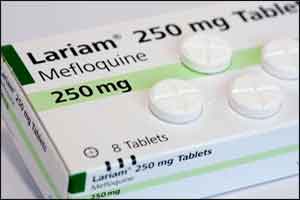- Home
- Editorial
- News
- Practice Guidelines
- Anesthesiology Guidelines
- Cancer Guidelines
- Cardiac Sciences Guidelines
- Critical Care Guidelines
- Dentistry Guidelines
- Dermatology Guidelines
- Diabetes and Endo Guidelines
- Diagnostics Guidelines
- ENT Guidelines
- Featured Practice Guidelines
- Gastroenterology Guidelines
- Geriatrics Guidelines
- Medicine Guidelines
- Nephrology Guidelines
- Neurosciences Guidelines
- Obs and Gynae Guidelines
- Ophthalmology Guidelines
- Orthopaedics Guidelines
- Paediatrics Guidelines
- Psychiatry Guidelines
- Pulmonology Guidelines
- Radiology Guidelines
- Surgery Guidelines
- Urology Guidelines
Cochrane review finds psychiatric side effects in less than 1% users of mefloquine

Researchers from LSTM Cochrane Infectious Diseases Group publish two systematic reviews this week about the safety of mefloquine (Lariam) for preventing malaria in travelers.
"Mefloquine is at least as effective as other options," says Dr Tickell-Painter, the lead author on both papers, "but patients and policy-makers also need reliable information about common side-effects before they can make informed decisions'. Mefloquine has been linked with psychological side effects since its introduction in the 1980s, and the Cochrane review published on Monday now brings together over 50 randomized and non-randomized studies, enrolling over 1,000,000 people, and compares mefloquine with all the alternatives in common use.
"There is no doubt that mefloquine does cause more sleeplessness, abnormal dreams, anxiety and depressed mood than the alternatives," says Dr Tickell-Painter, "but the review clarifies that these are symptoms reported by people taking mefloquine and not formal psychiatric diagnoses. Serious side effects with mefloquine seem to be rare, less than 1% of users, and increases in formal diagnoses of depression and psychosis have not been seen in people returning from travel in any of the large database studies."
The researchers continued their investigation of the severity of these effects in their second paper published today in the journal Travel Medicine and Infectious Diseases. This paper used systematic methods to search for and appraise all case reports of deaths and attempted suicides associated with mefloquine. From 527 reports, the authors could only reliably attribute causality for one attempted suicide and a probable association for two deaths, which appeared to be atypical drug reactions. The authors considered all other reports of links unlikely or containing insufficient information to make a judgment.
"We hope that our review provides clarity in the debate about mefloquine" continued Dr Tickell-Painter, "and by providing more reliable estimates of the frequency and severity of common side effects, we can ensure proper informed discussions between doctors and patients about the relative merits of mefloquine, atovaquone-proguanil (Malarone), and doxycycline"

Disclaimer: This site is primarily intended for healthcare professionals. Any content/information on this website does not replace the advice of medical and/or health professionals and should not be construed as medical/diagnostic advice/endorsement or prescription. Use of this site is subject to our terms of use, privacy policy, advertisement policy. © 2020 Minerva Medical Treatment Pvt Ltd